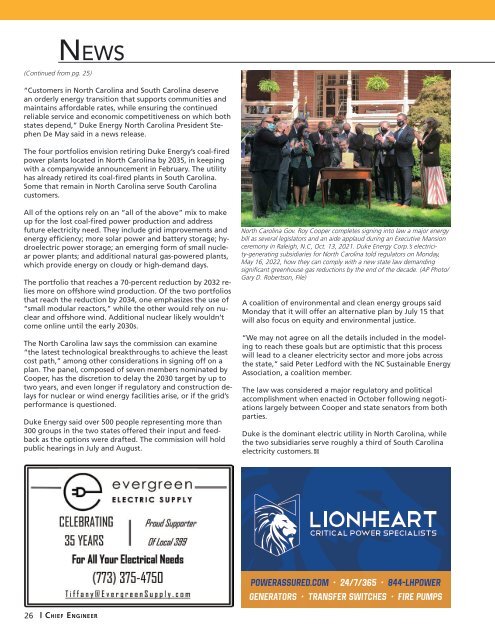CEAC-2022-06-June
Create successful ePaper yourself
Turn your PDF publications into a flip-book with our unique Google optimized e-Paper software.
News<br />
(Continued from pg. 25)<br />
“Customers in North Carolina and South Carolina deserve<br />
an orderly energy transition that supports communities and<br />
maintains affordable rates, while ensuring the continued<br />
reliable service and economic competitiveness on which both<br />
states depend,” Duke Energy North Carolina President Stephen<br />
De May said in a news release.<br />
The four portfolios envision retiring Duke Energy’s coal-fired<br />
power plants located in North Carolina by 2035, in keeping<br />
with a companywide announcement in February. The utility<br />
has already retired its coal-fired plants in South Carolina.<br />
Some that remain in North Carolina serve South Carolina<br />
customers.<br />
All of the options rely on an “all of the above” mix to make<br />
up for the lost coal-fired power production and address<br />
future electricity need. They include grid improvements and<br />
energy efficiency; more solar power and battery storage; hydroelectric<br />
power storage; an emerging form of small nuclear<br />
power plants; and additional natural gas-powered plants,<br />
which provide energy on cloudy or high-demand days.<br />
The portfolio that reaches a 70-percent reduction by 2032 relies<br />
more on offshore wind production. Of the two portfolios<br />
that reach the reduction by 2034, one emphasizes the use of<br />
“small modular reactors,” while the other would rely on nuclear<br />
and offshore wind. Additional nuclear likely wouldn’t<br />
come online until the early 2030s.<br />
The North Carolina law says the commission can examine<br />
“the latest technological breakthroughs to achieve the least<br />
cost path,” among other considerations in signing off on a<br />
plan. The panel, composed of seven members nominated by<br />
Cooper, has the discretion to delay the 2030 target by up to<br />
two years, and even longer if regulatory and construction delays<br />
for nuclear or wind energy facilities arise, or if the grid’s<br />
performance is questioned.<br />
Duke Energy said over 500 people representing more than<br />
300 groups in the two states offered their input and feedback<br />
as the options were drafted. The commission will hold<br />
public hearings in July and August.<br />
North Carolina Gov. Roy Cooper completes signing into law a major energy<br />
bill as several legislators and an aide applaud during an Executive Mansion<br />
ceremony in Raleigh, N.C, Oct. 13, 2021. Duke Energy Corp.’s electricity-generating<br />
subsidiaries for North Carolina told regulators on Monday,<br />
May 16, <strong>2022</strong>, how they can comply with a new state law demanding<br />
significant greenhouse gas reductions by the end of the decade. (AP Photo/<br />
Gary D. Robertson, File)<br />
A coalition of environmental and clean energy groups said<br />
Monday that it will offer an alternative plan by July 15 that<br />
will also focus on equity and environmental justice.<br />
“We may not agree on all the details included in the modeling<br />
to reach these goals but are optimistic that this process<br />
will lead to a cleaner electricity sector and more jobs across<br />
the state,” said Peter Ledford with the NC Sustainable Energy<br />
Association, a coalition member.<br />
The law was considered a major regulatory and political<br />
accomplishment when enacted in October following negotiations<br />
largely between Cooper and state senators from both<br />
parties.<br />
Duke is the dominant electric utility in North Carolina, while<br />
the two subsidiaries serve roughly a third of South Carolina<br />
electricity customers.<br />
Powerassured.com • 24/7/365 • 844-LHPOWER<br />
Generators • Transfer Switches • Fire Pumps<br />
26<br />
| Chief Engineer


















